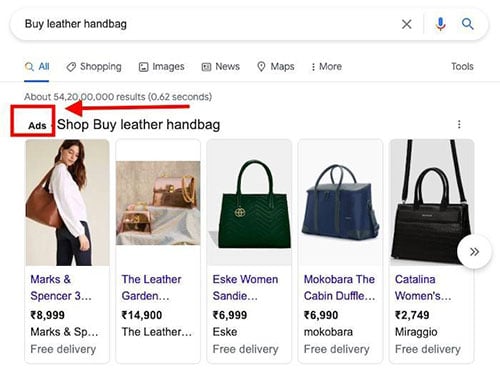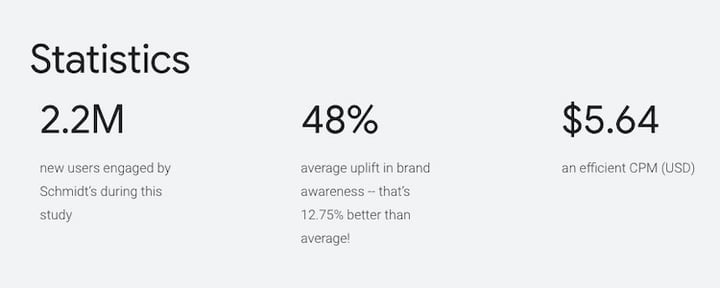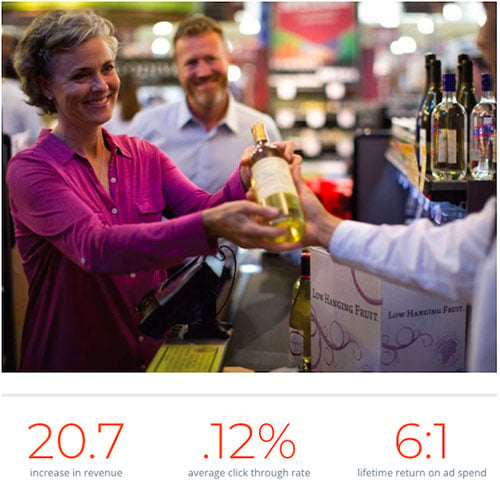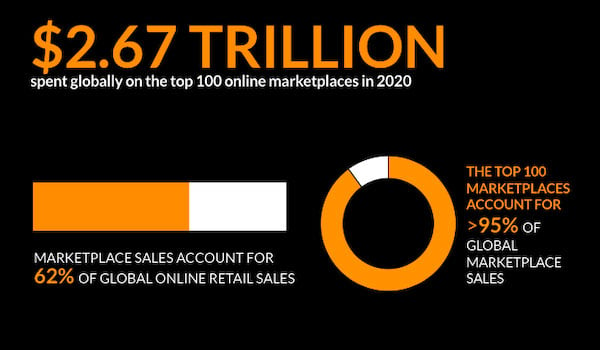-
 Written by Mark Xavier Quadros
Written by Mark Xavier Quadrosa SaaS content marketer that helps brands create and distribute rad content.
The main difference between PPC and marketplaces is that PPC drives traffic to your website or webshop, while advertising on marketplaces will lead visitors to your products on that platform (for instance Amazon). For many e-commerce businesses, a combination of both can generate the best results.
In this blogpost, we will dive into both marketing tactics in depth, compare both and help you figure out how to create the best balance.
First, let's take a look at what PPC is and why it is valuable. Then, we will describe the what, how and why of marketplaces.
What is PPC?
PPC, which is commonly referred to as “pay per click”, is when you pay a search engine like Google to place your ad directly above their natural search results. You can also run PPC ads on social media platforms like Facebook, YouTube, and the like.
These ads (or “sponsored links”) are related to your niche and are designed to get clicks back to your website, blog, landing pages, and more.
Take these PPC ads, for instance:

Businesses, both large and small, love using pay-per-click ads as a method of advertising. They are an invaluable source of targeted traffic to increase revenue, leads, and ROI.
The Power of PPC
1. PPC helps you scale your small business
The Internet is a vast assortment of information. It's also an ideal location to set up a business.
In order to do that, though, you will need to create a website and be able to get others in your area to come there to see your services or products.
But how will your target audience know about you and your brand? How will you direct them to your website? The answer to both of these questions is a PPC campaign.
Pay-per-click advertising offers an affordable way to get your business off the ground. It will not only help you promote your small business, but also helps you test your target audience without having to risk a large sum of money.
For instance, Schmidt Naturals, an online American retailer that sells products such as deodorants and soaps, was able to boost its brand awareness by 48% by implementing Google Ads.

And that’s not all. PPC campaigns not only help achieve short-term internet marketing objectives but also can indirectly help build links by increasing website traffic.
2. PPC ads are measurable and trackable
One of the biggest advantages of PPC ads is the ability to track and measure data, eliminating the need to use third-party marketing data tools.
For example, if a blogger promotes their website through social media, then it’s not entirely clear if people are interested in their content or if they simply want to check out their website or social media profile.
But with PPC ads, it’s clear how much a click is worth and if an ad will improve conversion rates. They also show how your campaign is performing and the type of traffic and results it brings for you.
Read more about PPC reporting on the blog here.
3. High ROI
Paying for advertising will almost always net you a higher return on investment than any free or organic marketing. According to Google Economic impact, the ROI for PPC ads is $2 for every $1 invested.
If that isn’t convincing enough to prove the high ROI PPC renders, there’s another impressive statistic. In the Hanapin Marketing’s State of PPC 2019-2020 report, a whopping 74% of brands said “PPC is a huge driver for their business.”
These brands affirmed that PPC played a huge role in their business and attributed PPC to a noteworthy portion of their sales.
4. Enjoy the local benefits of PPC advertising
Local PPC advertising can be a powerful tool to reach your target audience. It allows you to focus on local customers that are searching for products and services in your area.
Being able to target in your area is also helpful because you can bring in more customers per dollar spent.
As per studies, searches that included the phrase “near me” increased by about 28% in 2020. With the pandemic regulations coupled with the importance of shopping locally, the figures are likely to increase. It is thus vital to consider the local benefits of PPC ads.
5. PPC ads help you with retargeting
With paid marketing ads such as Adwords or Facebook Ads, you control the content of your ads since they are part of a larger ad network. This is where retargeting comes into play.
When users visit your website, PPC advertising helps you collect info about your audience. This information can be used to help you retarget potential customers who have already visited your website to make a purchase.
This could increase your ROI by providing a new offer to them for something related to their past purchases.
Total Wine, a brand with 200 stores across the US, partnered with ReTargeter and planned a strategy to drive traffic and online sales.
The retargeting strategy was focused on CRM and abandoned carts. They also invested in creative assets to give a customized shopper experience.

As a result, their revenue increased 20.7% year-on-year, a 6:1 lifetime return on ad spend, and a 50% increase in reach year-on-year.
6. Get insights on your market share
Aside from helping you find where your PPC is also great for cross-referencing. It will reveal what market share your business can get.
You can use the data available in Google Ads to optimize your listings and for other content marketing efforts.
What are Marketplaces?
A marketplace is a website or platform which allows advertisers and publishers to buy and sell advertising space at an agreed price.
The idea behind ad marketplaces is that it creates a system of supply and demand for different types of advertising (display, text, video, mobile, etc.) in order to buy and sell advertising space.
The Power of Marketplaces
1. Helps boost sales
Getting consumers’ attention is harder than ever, which is why these marketplaces are growing most rapidly among businesses that specialize in products and services that can be paired with consumer needs.
For one, marketplaces give sellers access to a huge customer base. There are also high chances of customers finding and ending up buying products they didn’t intend to buy initially.
Statistics suggest that in 2020, customers spent more than 2 trillion dollars on the top 100 online marketplaces.

Provided you know how to build an unbeatable sales pipeline, you can leverage the huge customer base that most marketplaces have.
2. Eliminates the need of stocking up inventory
For many businesses that are just stepping out of their local marketplace, online marketplaces such as Amazon and eBay seem to be an attractive option for selling goods.
One of the advantages of e-commerce marketplaces is that they eliminate the need to keep an inventory. Otherwise, goods that fail to sell on time lose their value.
Selling on marketplaces also allows you to experiment with a dropshipping business model eliminating the need to worry about product sourcing.
3. Increased customer engagement and segmentation
Even in 2016, Amazon had about 353 million products listed on its platform. The number is most likely larger in 2022.
Ad marketplaces provide increased customer engagement and segmentation, increased revenue opportunities, and a shift from product-based advertising to customer-engagement-based advertising.
4. Earn through numerous revenue stream
There are various ways to make money on the internet today. If you choose the right marketplace, the possibilities are endless and can be very profitable.
There are several revenue streams that marketplace owners can choose from, including:
- Commissions
- Subscriptions
- Listing fees
- Lead generation fees
- Ads
- Offering additional services
Marketers can also use a combination of two or more monetization schemes.
The key difference between PPC and Marketplaces
So you're starting off in business, and are looking at where to find your first customers to boost your sales. You've heard of PPC. You've heard of marketplaces.
When it comes to getting your products discovered online, there are a lot of options to choose from. Let’s find the key differences between the major ones - PPC and marketplaces.
- PCC channels help you reach new customers and drive sales on your online store. On the other hand, marketplaces let you sell within their platforms and leverage built-in customers and marketing programs.
- Finding success on PPC channels depends on budget, bid, and data. However, to increase your chances of succeeding on marketplaces, you need to optimize product listings and leverage order fulfillment solutions.
- The most popular PPC channels for e-commerce include Google Shopping, Microsoft Shopping Campaigns, Facebook Dynamic Product Ads, Pinterest, and Snapchat. The most used marketplaces include Amazon, Buy on Google, Facebook Shops, Walmart, and eBay.
So, these were just some of the factors to be considered when differentiating between PPC and marketplaces.
Finding a balance
The art of marketing is not a simple one. It’s an amalgamation of a number of different processes and channels. The right mix will help you ward off extensive competition online and allow you to set up a lucrative business.
PPC and marketplaces have revolutionized the marketing world. Almost every company is using them as a way to boost their sales.
Marketplaces, as driven by first-party data, can be used to increase conversions and bring in leads. They also serve as a marketing tool that helps you set up your business, increase brand awareness, and get the needed traffic.
On the other hand, reaching customers who have shown a direct interest in buying your product before is also crucial to increasing sales. That’s where PPC - an easy way to drive traffic from search engines - comes in handy.
A good marketing mix will help you to achieve your business goals and give you a competitive edge.
Advertise your way to internet fame!
What works best for boosting your brand awareness and online sales? Should you use PPC or marketplaces?
It’s a trick question.
The truth is both works very well. And if you can find the right balance between these two, you should see considerable success in your online business.
Read this next: what is the marketing mix?
-
 Written by Mark Xavier Quadros
Written by Mark Xavier Quadrosa SaaS content marketer that helps brands create and distribute rad content.
